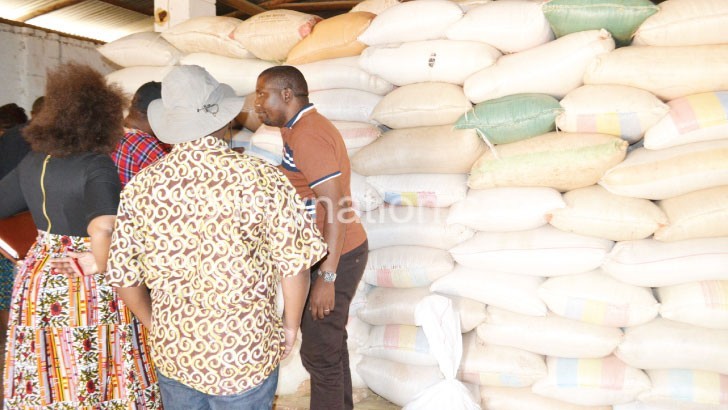Malawi tipped on diversification, FDI
International Food Policy Research Institute (Ifpri) has advised Malawi to consider combined efforts on agriculture diversification and promoting foreign direct investment (FDI) to create more jobs and boost economic growth.
In its policy brief titled Malawi’s Challenging Employment Landscape: Any Signs of Structural Transformation, the institute says such combined efforts may provide the technology and markets to create higher income jobs for the increasing educated population and subsequently boosting the economy.
It also observes that as population continues to grow, more youths will enter the job market; hence, government needs to diversify the economy to respond to the population needs.
The input comes at a time the country is struggling to diversify its economic base manifested by continued dependence on the agriculture sector and semi-processed tobacco exports, in particular.
Reacting to the report on Tuesday, Economics Association of Malawi (Ecama) president Chikumbutso Kalilombe said there is need for policy strengthening and mapping of priority areas the country desires for FDI to grow the economy.

He said: “On agriculture, we should start on value adding and also creating a local market for the products other than just raw materials, for example, local tomato sauce and jam, among others.
“Recently, we have seen sweet potato and cassava crisps being made locally. Those are the initiatives we should pursue. We also need to be sure of areas we want FDI for.
“Let us work out a plan and attract investors, for example, in the energy sector. Apart from FDI, let us also encourage local investment. Diversification has been hampered by the lack of will from both government and the private sector. There has been unfavourable macroeconomic environment, bureaucratic processes, including some elements of corruption, support structure deficiencies such as energy, among others”.
Kalilombe warned that if swift action is not taken to provide for the needs of the population such as jobs and social services, the nation will be heading into a catastrophic socio-economic situation.
University of Malawi’s Chancellor College economics professor Ben Kaluwa, commenting on why Malawi is failing to attract FDI compared to its neighbours, said the major problem lies with government’s indecisive policymaking decision which, he said, tends to be conservative and not willing to take bold steps in favour of investment.
He said: “If we are talking about attracting FDI, we are talking about risk-taking, and investors are risk takers. So, if as a country we are conservative, we do not want to take bold steps in the right direction bthen we cannot succeed in attracting FDI.”
Kaluwa said Malawi has been lukewarm in embracing a flexible foreign exchange rate regime, citing before 2012, “when we had been sitting on the exchange rate which was a major factor in scaring FDI into Malawi”.
“There are other areas too such as lack of infrastructure, for instance, in production investment like primary and secondary phases. Investors need vibrant infrastructure.
“If you are going to move imports, you have to move them quickly and rail transport is the most cheapest after water transport, but we allowed some business operators to monopolise road haulage and neglect the rail transport. This is the major area and transportation costs are heavy in investment or production,” he said.
Kaluwa said neighbouring countries are competitive in attracting FDI because their policies are harmonised and they continue improving in infrastructure.
He also cited government’s retaliatory policy on visa requirement for visitors coming from European countries and others as among harmful policies that are unfriendly to investors, adding that Malawi is losing out compared to the readily developed countries in Europe and its African peers.
An analysis by consultant Onelie Nkuna done on behalf of the Reserve Bank of Malawi (RBM) on the state of FDI in Malawi and other Sub-Saharan Africa highlights that political and business environment is not conducive to attract FDI.
Reads the report in part: “Political and governance is another impediment. The investors felt that corruption, security, bureaucracy, regulatory framework were the most important negative factors affecting investment.
“Despite the existence of the Anti-Corruption Bureau [ACB], investors in Malawi found corruption to have the strongest negative effect relative to other factors relating to governance. However, efforts have been made by government to strengthen this institution.”
The Ifpri report has recommended that attracting more FDI will require improvements in transport infrastructure, energy supplies and urban development—as most new jobs will be in cities and will require reliable power and better connections to markets.
The report also recommends public investment as critical to promoting employment opportunities inside and outside agriculture.
“Increased value addition through processing of agricultural products, light mechanisation that reduces the drudgery of farming and agricultural diversification are all likely to be central components in a successful structural transformation,” reads the report.
It says a more dynamic, diverse and productive agriculture sector should catalyse growth and product diversification in the non-farm sectors and to generate more new jobs.
Figures from Malawi Investment and Trade Centre (Mitc) show that Malawi’s FDI was estimated at $1.5 billion, representing 21 percent of gross domestic product (GDP) in 2018.
The United Nations Conference on Trade and Development World Investment 2018 Report, estimated Zambia’s FDI at $2.1 billion, Mozambique’s $2.3 billion, Zimbabwe $4.6 billion and Tanzania was estimated at $1.18 billion.





